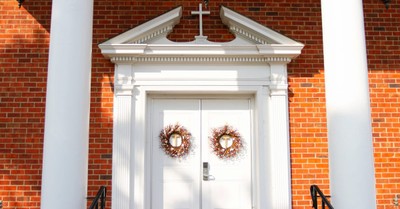The Popular Saint Hardly Anyone Knows
Reading Time: 4 minutes
Another explosion in Austin, Texas, the fourth this month, injured two men last night. Vladimir Putin was elected to his fourth term as Russia’s leader with 76.67 percent of yesterday’s vote, his highest score ever. And March Madness saw so many upsets over the weekend that Fox Sports called the tournament a “once-in-a-generation kind of ride.”
However, I’d like to focus today on someone who made global news on Saturday but didn’t.
Chicago dyed its river green in his honor; Vice President Pence marched in a parade in Savannah, Georgia; the US women’s hockey team appeared at yesterday’s parade in Boston. Countries around the world celebrated his day.
All in honor of a saint whose real story few people really know. Here’s why you should.
“Come and walk still among us”
Imagine that you were credited with 120,000 conversions and the planting of three hundred churches. How would you begin your memoirs?
Here’s how St. Patrick began his: “I Patrick, a sinner, the rudest and the least of all the faithful, and an object of the greatest contempt to many . . .” In honor of St. Patrick’s Day last Saturday, I read his Confession and was astounded by what I found, not least his genuine humility.
St. Patrick died on March 17, around the year AD 461. Here is just some of the remarkable story his Confession tells.
He was born in Britain but kidnapped when he was fifteen years old and sold as a slave in Ireland. For six years, he worked as a shepherd. He then escaped and returned home to his family.
When he was around forty years old, he had a dream much like Paul’s Macedonian vision in Acts 16: “There I saw in a vision of the night a man whose name was Victoricus, coming as if from Ireland with innumerable letters, one of which he handed to me.” Just then, he heard the voice of a multitude “as if with one voice, ‘We entreat thee, holy youth, to come and walk still among us'” (Confession of St. Patrick, 3.10).
Responding to this vision, Patrick returned to the land where he had been enslaved, this time as a Christian missionary. Frequently risking his life, he spent the next thirty years seeking to lead the Irish to Jesus. As one historian put it, St. Patrick “found Ireland all heathen and left it all Christian.”
How St. Patrick saved civilization
And there’s even more to the story.
In the next century, Irish Christians who were spiritual descendants of St. Patrick’s ministry sailed back to Britain, where they evangelized the heathen who had overrun the country. They established monasteries and copied books being destroyed elsewhere.
According to Thomas Cahill’s How the Irish Saved Civilization, these men “single-handedly refounded European civilization throughout the continent.”
You could make the argument that St. Patrick deserves to be on anyone’s top-ten list of all-time most influential Christians. But you’d have a hard time getting Patrick to agree.
He closed his memoirs by explaining the secret to his history-changing ministry: “Do you judge, and let it be most firmly believed, that it was the gift of God. And this is my Confession, before I shall die.”
“Now my eye sees you”
What is the key to St. Patrick’s humility?
The Book of Job is filled with theological discourses in which Job questioned the ways of God and his friends tried to explain them to him. Then the Subject of their debates showed up.
After God reminded Job of his astounding power in creating the universe, Job admitted: “I have uttered what I did not understand, things too wonderful for me, which I did not know” (Job 42:3). Then he added this key insight: “I had heard of you by the hearing of the ear, but now my eye sees you; therefore I despise myself, and repent in dust and ashes” (vv. 5-6).
Here we find the key to genuine humility: experiencing God. When we see the Lord in all his awesome majesty, we see ourselves as we really are.
When Isaiah “saw the Lord,” he said of himself: “Woe is me! For I am lost” (Isaiah 6:1, 5). When Jeremiah heard the voice of God, one of the greatest prophets in history responded, “Ah, Lord God! Behold, I do not know how to speak” (Jeremiah 1:6).
When Peter beheld the divine power of Jesus, “he fell down at Jesus’ knees, saying, ‘Depart from me, for I am a sinful man, O Lord” (Luke 5:8). John recorded his response when he met the exalted Christ on Patmos: “I fell at his feet as though dead” (Revelation 1:17).
When we encounter God
When you and I measure ourselves by other people, we can be tempted by pride or by insecurity. We will judge ourselves either better than others or inferior to them. Neither outcome is God’s intention for us.
St. Patrick knew God, and because he knew God, he knew himself. He knew that he was “a sinner, the rudest and the least of all the faithful.” But he also knew that God had used him in mighty ways to transform a nation.
When we encounter the living God, we see our finitude in light of his infinity. We see our impotence in light of his omnipotence. We see our foolishness in light of his omniscience.
But we also see ourselves as someone the Father considered worth the death of his Son. We see ourselves as someone the Holy Spirit can use to change our culture. We see ourselves as instruments of our infinite, omnipotent, omniscient Lord.
When was the last time you had a genuine encounter with the living God?
Photo courtesy: Wikimedia Commons
Publication date: March 19, 2018
For more from the Denison Forum on Truth and Culture, please visit www.denisonforum.org.
Do you want to live a life in whole-hearted pursuit of loving God and others?
Read today's First15 at www.first15.org.


















